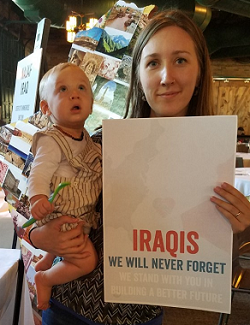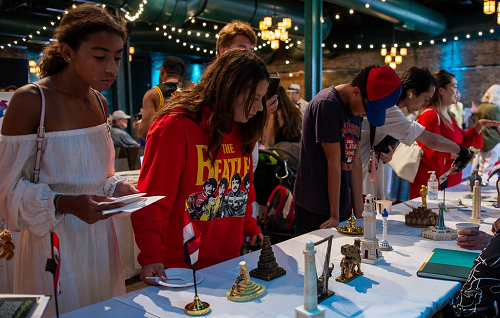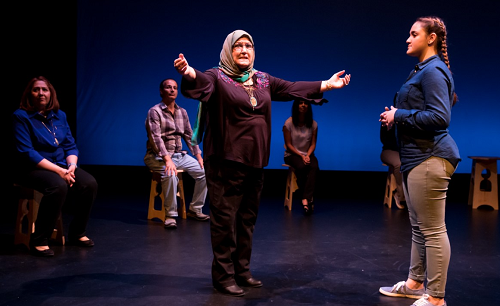Building Bridges of Communication: Iraqi and American Reconciliation Project
 Wednesday, October 5, 2022 at 2:02AM |
Wednesday, October 5, 2022 at 2:02AM |  Becky Fillinger |
Becky Fillinger | Article by Becky Fillinger
 Jessica Belt Saem EldahrOn March 20th, 2003, U.S. forces invaded Iraq. The war and occupation came to an end when the last U.S. troops left on December 18, 2011. Over 4700 U.S. and allied troops died in the war and hundreds of thousands of Iraqi civilians were killed, the exact number is unknown. The Iraqi and American Reconciliation Project (IARP) was formed in 2007 to build bridges and a more peaceful and just world. We talked to Jessica Belt Saem Eldahr, Artistic and Programs Director, to learn more about the mission and programs of the organization.
Jessica Belt Saem EldahrOn March 20th, 2003, U.S. forces invaded Iraq. The war and occupation came to an end when the last U.S. troops left on December 18, 2011. Over 4700 U.S. and allied troops died in the war and hundreds of thousands of Iraqi civilians were killed, the exact number is unknown. The Iraqi and American Reconciliation Project (IARP) was formed in 2007 to build bridges and a more peaceful and just world. We talked to Jessica Belt Saem Eldahr, Artistic and Programs Director, to learn more about the mission and programs of the organization.
Q: Please tell us the history and impacts of the Iraqi and American Reconciliation Project.
A: Early in the war, a group of colleagues and local peace activists, started IARP as a way to build bridges of communication, understanding, and support between the people of Iraq and the people of the U.S. Working with an Iraqi nonprofit Muslim Peacemaker Teams, the group started protesting the war, hanging art (carried in suitcases from Iraq) across Minneapolis in coffee shops, and funding water filters for Iraqi schools. When the group realized the overwhelming level of destruction of Iraq’s infrastructure and the devastating toll on its society after years of sanctions, war, and continuing occupation, they decided to incorporate as a nonprofit organization. They knew this would be a long-term commitment to the people of Iraq. In 2009, IARP worked with the City of Minneapolis to nurture a resolution, unanimously passed by the Minneapolis City Council, to become Sister Cities with Najaf, Iraq. Since then, we have coordinated numerous exchanges and educational programs between Americans and Iraqis as part of the Sister City relationship with Najaf. More than 50 Iraqis visited Minneapolis through the relationship, including artists, teachers, students, medical professionals, business professionals, and government officials.
 Attendees at the 2022 Sister Cities Day learned about other cultures.
Attendees at the 2022 Sister Cities Day learned about other cultures.
Over the years, the IARP community has humbly attempted to address the horrors and injustices of the US-led war and occupation of Iraq and its continued legacy in Iraq today. Through the Water for Peace program, thousands of Iraqi children gained access to clean water. The program also involved hundreds of Americans in personal exchanges with Iraqis, through letter and photo exchanges at churches, schools and other organizations across the country. Now Humanitarian Projects for Peace, this project continues to make an impact in Iraq through the distribution of hygiene kits, Ramadan food baskets, restocking of the bookshelves at the University of Mosul library, and collaborations with Iraqi nonprofits who are meeting the needs of their community.
 Iraqi Voices Lab
Iraqi Voices Lab
IARP's Iraqi Art Project, born out of carrying artworks in suitcases, presents Iraqi and American visual art, film, music, poetry, bookmaking, and theater, bringing Iraqi and American artists, storytellers, and audiences together in meaningful dialogue. Exhibits featuring Iraqi and Iraqi American artists have reached tens of thousands across the Twin Cities, rural Minnesota, and the Midwest. The Iraqi Voices Lab, which gives Iraqi refugees and immigrants in Minnesota an artistic platform to share their stories, has harnessed the power of art to create spaces for dialogue, combat rising xenophobia and Islamophobia, and provides the Iraqi Minnesotan community access to artistic platforms to express themselves as individuals and as a community.
In the spring of 2016, we established the People to People program to respond the prevalence of dangerous public rhetoric against Muslims, refugees, and immigrants. The People to People program facilitates cultural, language, professional and personal exchanges, creating spaces for Iraqis and the general U.S. public to meet and learn from one another. The program also celebrates, preserves, and shares the richness and complexity of Iraqi culture. These have included cooking classes, the first Iraqi cultural booth at the Festival of Nations, and events featuring Iraqi food, music, dance, and more.
IARP is an organization led by and for Iraqis and Americans learning and working together to live in a peaceful and just world.
Q: Your projects are so commendable – do you have upcoming events?
A: Yes!
- Afro-Iraqi Rituals: Stigma, Discrimination, and Resilience, October 8, 11:00am: Afro-Iraqis have been subjected to oppression, racism, and discrimination. This panel, co-presented by IARP and the Lotus Cultural Women’s League, explores the significance of Afro-Iraqi rituals and Afro-Iraqis’ resilience in facing stigmatization and discrimination in Iraq. Interpretation will be provided in English and Arabic. Register here to receive the Zoom link.
- From our friends at the Jungle Theater: King Gilgamesh & the Man of the Wild will open at the Jungle on December 31, 2022 and run through January 8, 2023. A collaboration between Toronto-based musician/actor Ahmed Moneka and actor/writer Jesse LaVercombe with Chicago playwright and director Seth Bockley, this two-man epic reanimates the world’s oldest written narrative with maqam-style Iraqi music and 21st century biography, highlighting Moneka’s own exile from Baghdad. King Gilgamesh fuses highly physical theatre, soul-filled musical expression, ancient text and intimate storytelling, illuminating the tale’s eternal mysteries of mortality and the universal balm of friendship. It’s a short run but something you won’t want to miss!

Q: How may we stay up to date with your events and programs?
A: Please follow us on social media, Facebook, Twitter and Instagram. You may also sign up for our newsletter through our website.
